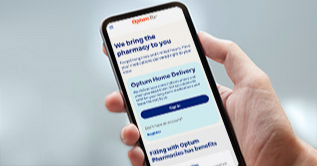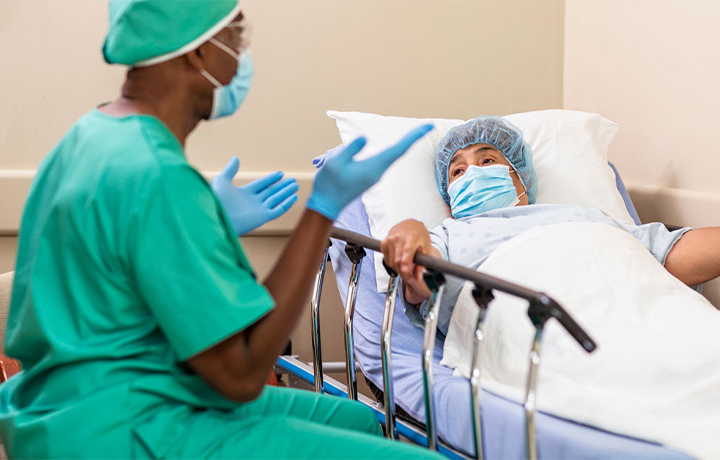Surgical care FAQ
This depends on location, but some examples of same-day surgery include:
- Appendectomy (removing the appendix, a small tube that branches off the large intestine)
- Cataract surgery (removing a cloudy lens from the eye)
- Colonoscopy (an exam of the inside of the large intestine)
- Lumpectomy (removing a cancerous lump in the breast and some tissue around it)
- Skin cancer surgery (removing cancerous moles and some tissue around them)
- Tonsillectomy (removing one or both tonsils in the back of the mouth)
Outpatient surgery is sometimes called same-day or ambulatory surgery. It can be a good choice for several reasons.
- Doctors use less-intensive drugs. These drugs put you in a sleep-like state for a short time.
- These procedures involve fewer cuts. This means you’ll probably have less pain and heal more quickly.
- Heal faster. You can go home the same day and get back to your normal daily life faster.
This depends on the type of surgery, test or procedure you’re having. Your outpatient surgery center and doctor will let you know what you need to do. This may include limiting food and drinks hours before you arrive, for example. You may also be asked to:
- Bring a friend or family member.
- Plan ahead for recovery time.
- Be aware of side effects.
- Wear comfortable, loose-fitting clothing.
- Leave jewelry and valuables at home.
Our surgical teams offer a variety of general surgery procedures. Some of these may include:
- Breast surgery
- Colorectal surgery (colon and rectal)
- Gallbladder removal surgery (cholecystectomy)
- Lymphedema surgery (malignant and inflammatory conditions of the lymphatic system)
- Parathyroid surgery
- Soft tissue surgery
- Thyroid surgery (thyroidectomy)
- Weight loss surgery (bariatric)
Check with your doctor and clinic to find procedures offered in your area.
Minimally invasive (also known as laparoscopic) and robotic surgeries are done with tiny incisions (cuts). They use these smaller cuts instead of one large opening. A long, thin tube with a small camera at the end (called a laparoscope) is passed through one of the incisions.
With minimally invasive surgery, patients heal faster. There is also less scarring than with traditional surgery. Our minimally invasive surgery team performs surgeries in women’s health, breast care and general surgery.
Some positive aspects of minimally invasive surgery include:
- Faster recovery
- Less pain
- Going back to normal daily life and movement faster
- Shorter hospital stays
- Lower total cost of care for both you and your health plan
Check with your doctor and clinic to find procedures offered in your area.
Colon and rectal surgery treats problems with the rectum, anus and colon. When an issue happens in any of these places, it can cause a lot of discomfort and pain. This can affect your overall health.
Our care team will make you feel at ease and well-informed when talking about and treating your medical problem.
Optum colorectal surgeons can treat a variety of sudden or short-term and chronic (long-term) conditions for you and your family. Types of problems our surgeons care for include:
- Acute diverticulitis: pouches that form in the colon and become infected
- Anal abscess or fistula: buildup of germs in glands near the anus
- Anal fissure: a tear in the tissue that lines the anal canal
- Colon cancer: cancer in the large intestine
- Crohn’s disease: a problem when the colon becomes swollen and painful
- Hemorrhoids: swollen and bleeding veins around the anus
- Pilonidal cyst: an abnormal pocket of skin usually located near the tailbone
- Rectal bleeding: any blood that passes through the anus
- Rectal cancer: cancer that starts in the rectum and can spread to the last few inches of the large intestine
- Ulcerative colitis: pain and swelling in the lining of the colon
Check with your doctor and clinic to find procedures offered in your area.
Surgical oncology focuses on taking care of tumors. It’s especially focused on cancerous tumors. Our surgeons do surgeries to help with breast, stomach, and pancreatic cancers. They also do biopsies.
Some examples of cancer surgeries include:
- Appendectomy (removing the appendix)
- Breast lumpectomy (removing a lump in the breast)
- Bowel resection (removing part of the bowel)
- Gastrectomy (removing part or all of the stomach)
- Gastrostomy (a type of stomach surgery)
- Hemicolectomy (removing part of the colon)
- Liver resection (removing part or all of the liver)
- Mastectomy (breast removal)
- Melanoma excision (removing a melanoma or type of cancerous growth)
- Pancreatectomy (removing the pancreas)
- Thyroidectomy (removal of thyroid)
- Prostate surgery (prostatectomy)
Learn more about our cancer care.
Check with your doctor and clinic to find procedures offered in your area.
Breast surgery may be suggested to help with many breast problems, including:
- Atypical ductal hyperplasia (a marker that may make your chances of getting breast cancer go up)
- Atypical lobular hyperplasia (growth of abnormal cells in the breast)
- Bloody nipple discharge (when fluid leaks out)
- Breast abscess (a swollen area of tissue)
- Breast cancer
- Breast cysts
- Fibroadenomas or other lumps in the breast
- Flat epithelial atypia (not cancer, but abnormal cells found in the breast)
- Intraductal papilloma (a type of lump in the breast that is not cancer)
- Invasive breast cancer or non-invasive breast cancer (DCIS and LCIS)
- Metastasis (the spread) of breast cancer
- Microcalcifications (abnormal calcium deposits in the breast)
- Phyllodes tumors (a type of lump found in the breast)
Check with your doctor and clinic to find procedures offered in your area.
Endocrine surgery can help with a range of problems, including:
- Adrenal mass (a type of abnormal growth)
- Gastrinoma (a type of lump)
- Goiter (a large thyroid that isn't normal)
- Graves’ disease or hyperthyroidism (a type of thyroid problem)
- Papillary thyroid carcinoma (carcinoma is a type of cancer)
- Primary hyperaldosteronism (Conn's Syndrome or problem with the adrenal gland)
- Thyroid cysts (a type of growth in the thyroid)
- Thyroid nodule (a lump in the thyroid)
Check with your doctor and clinic to find procedures offered in your area.
Esophageal and foregut surgery focuses on caring for problems of the upper digestive tract or the esophagus. This is the part of the body that connects the throat and stomach.
Our surgical team works closely with other providers and specialists. This includes gastroenterologists, internal medicine specialists and family medicine doctors. We make sure you get the care you need, when you need it.
Common signs of issues that affect the esophagus, stomach and small intestine include:
- A burning or sharp sensation of the upper abdomen (middle of the body) or chest that gets worse when you change position
- Regurgitation or effortless vomiting
- Problems with swallowing
- A long-term cough or hoarseness that won’t go away
Check with your doctor and clinic to find procedures offered in your area.
Helpful resources

Article
What to do before you get home from surgery
Are you having an operation? Here’s your post-op checklist to help prepare for your rest and recovery stage.

Article
Get answers about outpatient surgery
You don’t always have to go to a hospital for routine procedures. Find out the benefits of outpatient care, as well as when to take advantage of it.

Article
Questions to ask if you have a new medication
Taking a new prescription drug can leave you with questions. Find out this information before you leave your doctor’s office.
*Outpatient surgery services vary by location. Check with your doctor’s office or health plan for specific information.
Optum arranges for or provides medical and other clinical services in accordance with laws in each state it operates. Physicians or providers referenced on this website are to those who are either part of independent practices or to those medical practices managed by or owned, where permitted, by Optum. In all circumstances, physicians and other licensed professionals have complete authority for all medical decision-making and patient care. Optum does not determine or set the methods, standards, or conduct of the practice of medicine or health care provided by any of the practices or their physicians or other licensed professionals.




